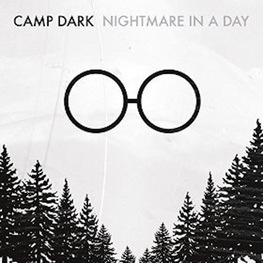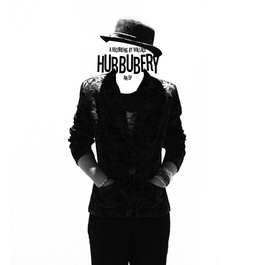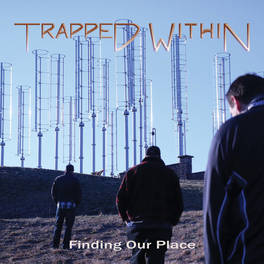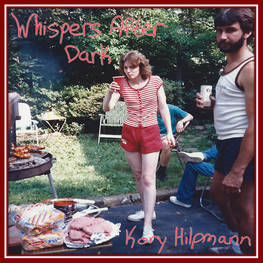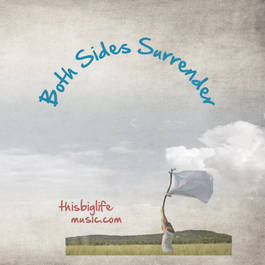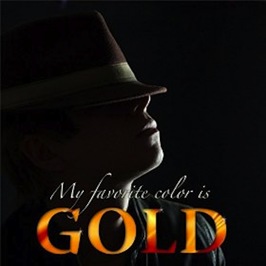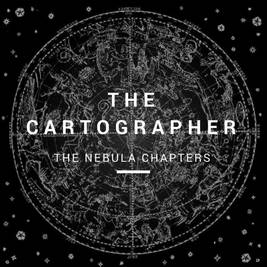|
The debut release from Camp Dark entitled Nightmare In A Day is one you won’t want to miss. It initially started as a project by Adam Svec (vocals/guitar) and Graham O’Brien (synths/samplers/drums) but quickly grew with an ample amount of contributors. Nightmare In A Day is a satisfying listen in a number of ways. The first thing I noticed is the sonic qualities of this album. It’s truly exceptional and the sounds explore everything in the frequency spectrum. From Portishead-style trip-hop style drums to shimmering synths and everywhere in between the album has a huge palette of textures and tones that at times feel limitless.
The songs on Nightmare In A Day aren’t afraid to get experimental and think outside of the box but also have a good amount of infectious melodies. It’s a combination, which is undeniably enjoyable that only a prolific band can manage to pull off. Albums like Neon Golden by The Notwist and We Forget It In People by Broken Social Scene are examples of what I am talking about and Nightmare In A Day touts a very similar exploration of combining sound and I welcome their music with open arms. The band opens up with “Are You Hiding” which was a good choice. It is dark atmosphere which is reminiscent of Portishead and is juxtaposed by vocals that are subdued yet are sing-along worthy. Svec repeats the lyrics like a mantra. He sings, “Are you hiding? I’d like to help you.” Svec on “Charlie” reminded me a bit of Ben Gibbard but the music sounds more like “Climbing Up The Walls” by Radiohead. “Arm Are You OK” gets into some inventive experimental territory. The verse sounds a bit similar to “Human Behavior” by Bjork but also goes off into directions you wouldn't expect. The exceptional “Family Curse” was another example of the band willing to test boundaries. I was more than enjoying the free jazz style drumming that combined with the Thom Yorke style falsetto. Arpeggiated synths and shimmering lights enter out of nowhere on the chorus. It's arguably the most inspired moment on the album. Even a song like “Former Lovers” which is a pretty straightforward song has a beautiful atmospheric ending that is a further testament to the band's talent while the closer “Words That Don’t Exist” has beautiful guitar playing and one of the most notable vocal performances. My only minor issue is the album feels a little long at thirteen tracks. For a debut the album may have been a bit more effective at ten but even that's arguable. Camp Dark is a new band that dwell in relative obscurity but I can’t imagine that would be the case if enough people hear their songs. Highly recommended.
2 Comments
One-man band Rylan Wallace Talerico produces music under the moniker Wallace, and his EP Hubbubery features an unintentionally made-up word as the record’s title. After realizing that “hubbubery” was not a real word, Wallace felt that he had no choice but to name the EP after the word he inadvertently created.
More intentionally within the record, Wallace exhibits his unconventional singing style, which fringes upon slightly melodic rapping with a tinge of Beastie Boys style. While the vocals are definitely not classical, Wallace has found a pocket and a niche in which his voice fits nicely, making for a unique aural experience. “The Same,” the first song on the EP, is the catchiest, most memorable song on the record, featuring his memorable voice relaying intriguing lyrics among a smattering of vivacious guitars and crashing cymbals and drums. The bluesy guitar solo in the intro of “Man and Wife” accompanied by upbeat drums and bright guitars steer the album toward a more blues-driven tempo and feel. The instrumentation is unchanged from the first song, but the style is significantly different. The bluesy pattern continues in “Lady.” However, this song features more experimental motifs and complex chords than previous tracks. This song has a female vocalist, giving the song enough interesting variation as to avoid becoming tedious and repetitive. “Monkey See, Monkey Do” is a lackluster instrumental song that barely differs in style from the previous songs on the EP. The redeeming quality comes in the last ten seconds of the tune, in a frantic ending that catches listeners off guard. Thankfully, the vocals return to the mix in “This Man” a groovy, gung-ho song that incorporates classic rock n’ roll techniques into some of the best riffs on the record. The EP comes to a close with “Ode to the Graduates” a cynical rant set to a solid rhythm, distorted guitar and diverse dynamics. This tune harkens back to the first song on the EP; the music coming full circle over the course of the record. The extended guitar solo at the conclusion of the song brings finality to Hubbubery, a remarkable album characterized by unconventional methods that are honed to the point of sensation.
Finding Our Place by Trapped Within is aptly named, a band finding its sound, its dynamic between new band members. There are some real gems on the album and each song is performed with a lot of heart.
The album opens with “Rising Sun,” which features an arpeggiated electric guitar in 6/8 time and vocals that have traces of Eddie Vedder and Brad Roberts. It’s a short but poignant introduction to the record. “Of Innocence” keeps up the early Pearl Jam influence as well as some early ‘90s Goo Goo Dolls. The verse is built around a singular riff and contrasted with a more spacey and open bridge before the band breaks down to show off the individual sections. The song is full of tangible energy. “Heart Lives For Content” has a plaintive melody that is sung with great emotion, accompanied by palm-muted guitars and tick-tocking arpeggios. The song also features some of the best guitar solos on the album, which are melodic and emotive, emulating the vocal melody but putting its own stamp on it. Some editing in length could help the song keep its momentum the entire time, but the bass feature near the end is a nice addition. On “One Night Stand” between chime-y guitar counterpoints in the verse and the distorted chorus makes it work very well here, differentiating each section while still finding continuity between them. “Revolution” has a Foo Fighters vibe to it based around a propulsive riff and a quick tempo. With a melody-guitar-solo and compact running time, the song is a great example of keeping in the most essential elements to highlight the best features of the writing. Some of the songs could benefit from some editing. “Euphoria” incorporates driving buzzy guitars, square wave synths and pulsating bass and drums under a filtered vocal. The verses and choruses have some grit and energy to them, but some of that gets lost during the instrumental solos, which let the song meander a bit and sometimes are out of sync with each other. Some trimming might streamline the song, which is catchy. “Let Her Ride” keeps a steady drumbeat throughout while dueling guitar parts rain down chime and fuzz. The band accents the lyrics in the chorus, which is effective in bringing out the chorus. Unfortunately when the band does it instrumentally in the middle of the song it comes across more like Morse code than a callback of the chorus. The song also stays in a similar dynamic throughout, and could use some more rises or falls in the energy or volume to give the sections some contrast. “Closure” is based around an acoustic guitar and a loud electric guitar countermelody. The song is a nice contrast to the faster rockers on the album, but some of the mixing puts the electric guitar so prominent, it steps on the vocal melody from time to time. Still, the chorus is extremely melodic and catchy and the guitar solo that follows sears and soars into anthemic beauty. “Where Have They All Gone” combines the garage jangle rock of a band like Them with a more bluesy festival jam like Ten Years After. Some of the spoken interjections of “yeahs!” and “come on’s!” could use the same vocal inflections that is displayed during the rest of the song to avoid some awkwardness. The middle guitar solos are epic, but then the song continues on for another verse and chorus and seems a bit long. “Wonderful World” feels a bit sloppy with the band out of time with themselves several times, the electric guitar pushed too far in front of the mix and some out of tune acoustic guitar. Again, the song feels a bit long with the extended guitar solo at the end (though with some great use of tone) with another chorus added on after that. The album closes with “Setting Sun,” the darker mirror image of the opening track now filled out with echoing rim clicks and more vibratos on the guitars. Here, the length of the track is earned as the song reaches a crescendo into the concluding guitar solo, which also features the most energetic drumming on the album. The band has a lot going for it, but some revisions/editing to the songs could make for a tighter more efficient package that shows off what they do best.
Western Pacific is the solo pop punk project by Derek Chan. His release 306 has an ample amount of traits that point to pop punk 101. The first thing is his vocal style and delivery. He sounds young and has that voice that seems to be a gold standard with the genre. The lyrics are also indicative of what you would expect from this genre. Let's face it the topics that pop punk bands tend to sing about resonant with the teenagers and kids who are around the legal drinking age. He sings about a girlfriend, life-decisions and house parties that smell foul. That being said I thought his lyrics themselves were thought out and often told engaging narratives.
I always preach about bands doing something, anything, different since there is so much competition these days. 306 is an acoustic album which is a nice change of pace but what really got my attention was that Chan pulled out a banjo. I applaud him for this and he not only attempts it but pulls it off. The banjo didn’t sound out of place and it was nice to hear some variation. The album goes through stages of sounding like stereotypical pop punk to having slight deviations. “Homegirl” is more or less pop punk 101. It’s a catchy tune but follows all the tropes of the genre from beginning to end. Chan busts out the banjo in “Passing Stone” which a single worthy song you can picture on mainstream radio. Chan sings about a relationship but as I mentioned earlier he has skill in the lyric department. He sings, “My timing is always wrong, like a clock running hours long, my batteries fine but my hands seem to make mistakes all the time.” “Misunderstood (Feat. Emily Faye)” is a solid tune and sometimes vocal duets can come off as contrived but this one worked. Faye has a good voice that works well against Chan’s. The bells were a nice touch as well. A highlight was unequivocally “For You.” There were female vocals on this song and I think it was Faye. This song veers more towards folk than pop punk and it sounded great. This is something that Chan may want to think about as he gets older. Yes for someone in their mid ‘30s or ‘40s folk songs tend to be more age appropriate.I really liked what I was hearing on the second half of the album (more so than the first half). “Tyson” and “All Right” were notable songs that showcased Chan’s talent. 306 at the very least offers something a little bit different under the pop punk genre. It’s certainly not a bad start. I hope to hear him evolve as an artist with his future releases.
Kory Hilpmann is a twenty-year old musician hailing from Oakland, NJ. His solo release Whispers After Dark revolves around piano, guitar and vocals. The first three tracks contain piano while the second half revolves around guitar. He points to Ben Folds, Billy Joel, Seabird and Bright Eyes as influences and all of that makes sense when you delve into his music.
Whispers After Dark varies in recording quality but it is fairly obvious that it's a home recording. The guitars are a bit tinny and the vocal treatment could have been better but the raw songwriting still shines through. Hilpmann shines a little bit more as an instrumentalist than a singer at this point. He is really a good piano player and I was consistently impressed. His singing could still use some work. He is noticeably off key at points and has some minor issues with his inflection. He opens with “Lost In Your Eyes” which is reminiscent of a saloon style piano bar type song. It dances upon the topic of true love in an Elizabethan Shakespeare kind of way. “I Don't Need Your Help” has a similar vibe but also suffers from some of the vocal problems present in the first song. On the next song “Wounds” he double tracked his vocals and it unequivocally sounds better. “Wounds” was the highlight of the six songs. It’s a catchy song with heartfelt emotion. “Not Too Much To Ask” is another success. Hilpmann’s guitar sounds good and his vocal delivery is spot on throughout most of the song. He continues to romanticize the concept of love as if there is no dirt or grime to deal with on ““Not Too Much To Ask” and “Missing You.” The most impressive thing about Hilpmann is his songwriting. This is where he shines. The songs are well put together and he has a good sense of how to build tension and release. It may be hard for him to hear but at least with this release he doesn't seem to be a naturally gifted singer but he shouldn’t let that deter him. He will undoubtedly get better the more he practices but he may also want to consider working with a vocalist on a project or two so he can focus on the arrangement of the song.
Oak St Assembly is the combined efforts of Evan Brown (guitar), Koby Leff (bass) and Josiah Harmar (drums/keys). Their recent release let's call it untitled ep is a mixed effort with some things that worked and other things that fell a little bit flat. This is a lo-fi release that emphasizes the lo-fi. It’s extremely lo-fi and on occasion that does work to their advantage.
The one thing that could have been improved is the timing. Some of the songs are noticeably off-time and not in a cool U.S. Maple kind of way. The highlight of the EP is “Hurricane Sandy.” I enjoyed the vocal delivery, lyrics and music. The music is loose and scattered but works. This also happens to be a song where the lo-fi elements worked to their advantage. The vocals sound top notch as well. Great stuff. Some of the other songs have things that work but need some tweaking. “Learning Curves” is a catchy song but has a hard time reaching the peaks it tries to conquer during the chorus. A lot of it has to do with the dynamics and super lo-fi drum sound. “Ashbourne CC” has some really engaging vocal harmonies that combine with a dirty bass. I wished the band built off that but instead the vocal harmonies are replaced by a kind of rapping that reminded me of the ‘90s band Cake. The band reinforces that vibe with “#apocalypsefarm” which also revives the spirit of The Bloodhound Gang. There's something slightly humorous about the song even though I couldn't always make out the lyrics. I have to a say a boost in recording quality would have helped out some of these songs. Hopefully, next time around the band can befriend an engineer or work in a studio. Overall, I dig the vibe these guys are putting out but it just needs a bit of work here and there.
Viral by Holiday At Sea is a concept album based around a science-fiction story. It works excellently to convey the story as well as a great example of amazing instrumental performances, great songwriting and phenomenal production. “V12” opens the album; a gorgeous instrumental with an emotional guitar melody soaring over a tight rhythm section. The build throughout the song is smart and the melodic development sublime.
“Torches” features some driving contrapuntal bass and staccato snare flourishes accenting the choruses. The lead vocal cuts through the sonic spectrum in a higher range and sits well into the mix with a Craig Wedren-like tone. There are some great instrumental passages and features throughout the song. “Open Door” showcases some extremely clever drumming finding great ways to build and accent the melody while still keeping a driving groove. Again, the countermelodies that are performed in the bass throughout are also a great addition to the song. Multitudes of guitars stacked on top of each other never get in each other’s ways, instead each tone clearly demonstrating an interesting puzzle piece to the construction of the whole song. “The Dawn” has a Jimmy Eats World rocker vibe to it. The drums and bass have quite a feature here again with double-time hi-hat punctuating explosive drums and upper octave bass melodies stepping into the lead through a sea of descending distorted guitars. Melodically, the song is very catchy and anthemic. “Escape” is a short instrumental built around rolling toms and steady sleigh bells. It’s a nice interlude and works very effectively as underscore. “Homecoming” opens with a fuzzed out thick riff before the vocals enter and the snare turns to a marching pattern. There are some nice contrasts between metal-ish attack of the band throughout and a short but effective bridge that opens up a bit. The middle of the song falls out of synch with itself a bit, but by the end the driving force is back seen through another searing guitar solo. “Resurrection” is another great instrumental that includes some Andy Summers-esque guitar patterns that sound synth-like as well as some percussion samples throughout. The B-section of the song is based around more of punk-rock guitar tone and riff and contrasts nicely with the first part. After a short but exciting drum solo, the song builds back up combining various features of the song into Townshend-like swirl of melodies. It works as an excellent penultimate culmination. The album closes with “Redemption” bringing back some of the Jimmy Eat World qualities to the driving heavy rock meets emotional vocal delivery parts of the song. Again, the band shows themselves adept at combining different dynamics and parts into a song from driving punk to rock opera builds. Combined with an excellent melodic use of feedback, it makes for a powerful conclusion to an exciting album.
Become A Fan
This Big Life slides into a moderately paced groove within the first seconds of “Dinner Song,” the first track on Both Sides Surrender, the first EP from the band. The delicate vocals of the female lead singer ease into the mix and gently carry the melody of the song among a blend of shifting bass riffs, throbbing percussion, a droning musette/accordion sound and light strumming. The song takes an unexpected turn when a male vocalist adds rapping and rhythmic singing, contrasting greatly with the soft female vocals featured in the rest of the song.
The EP continues its unrushed, relaxed pace with “Run in Circles” a similarly instrumented tune exhibiting multiple vocal harmonies and layered riffs that build upon each other as the song continues. This bouncy song is lyrically driven and its down-to-earth feel helps it to connect with listeners on a relational level. The title track of the EP “Both Sides Surrender” is a simple, soft ballad revolving around dueling mandolins providing accompaniment to sweet, lush vocals. The track slowly strengthens amidst sounds of thunder, rain and strings, finally giving way to a full band sound at the end of the track. The smooth melodies, skillful instrumentation and wide range of emotion and dynamics make this song one of the best, if not the best, on the EP. The lilting female vocals prominent in the first three songs of the EP are superseded in “Carry Me” by cavernously deep male vocals. The record takes on a relatively darker tone in this song, but as the gravelly vocals are joined by the return of the velvety female vocals from before, the song transitions into a beautifully hopeful anthem with just enough tinge of a shadow at the edge of the soundscape. The narrative of this EP follows a satisfying plot - each song feels like a raw idea that has been developed over time, without losing the unprocessed, natural vibes of the original concept. This, combined with the immense talent and variety in each in every track on the record, make Both Sides Surrender well worth many listens by listeners of all musical tastes.
Last year Casper Blanca released On Top of Sticky Fingers (Head, Bodies & Tales) and exactly one year later he is back with My Favorite Color is Gold. My Favorite Color is Gold sounds like it was made by at least a four-piece band but in fact it is just Casper Blanca. The multi-instrumentalist from Copenhagen plays a mix of rock, folk, pop and even a bit of blues and does so quite successfully. I was impressed by the consistently solid songwriting whether it was a distorted rock song or an emotionally resonant acoustic ballad.
Blanca gets started with a forty second “Intro” that revolves a couple of guitars that veer towards the blues. The “Intro” fades out and you are greeted with “Tug of War.” It’s one heck of a catchy song that mixes elements of garage and hard rock. Blanca’s vocal delivery is a bit nonchalant in a cool way like that of Julian Casablancas from The Strokes. The vocal harmonies during the chorus are additional ear candy that made the song work. It is evident that Blanca is not without a sense of humor when he chose to name a song “I’m On a Drug Called Charlie Sheen.” Blanca implements a hard rock/blue vibe on this song and pulls it off. It was obvious to me at this point that Blanca doesn’t have much problem finding a good hook. The chorus explodes with sweet vocal harmonies that are easy to enjoy. Blanca displays a different side to his talent with “Revealing a Magic Trick.” It revolves around little more than an acoustic guitar and his vocals. I like when Blanca rocks out but he sounds exceptional with some melancholy on his voice and sparse instrumentation. The next three songs are solid rockers, which are nothing to scoff at. The highlight of the album for me was “Come Down/Calm Down.” It’s a slower melancholy song that tugs at nostalgia in your mind. Blanca’s vocals were exceptional and made the song memorable. My Favorite Color is Gold is a solid follow up and certainly establishes that Blanca has enough creativity and songwriting talent to keep it up for a long time. I have to admit I would like to hear an album of only slower, acoustic material but My Favorite Color is Gold will certainly suffice. Recommended.
Ben Ludford-Brooks aka The Cartographer recently released his debut EP entitled The Nebula Chapters. Brooks has a background in classical guitar but not much of that shows up on this release. The Nebula Chapters combines heavy guitar riffs with atmosphere that is reminiscent of a band like Deafheaven. There are elements of metal, post-rock and some other sub genres but it isn’t too far off from the hybrid that a myriad of other bands are barking up.
The EP opens with “Expanse I: Origin.” You are presented with a steady, straightforward drumbeat and atmospheric guitars that lie somewhere between early Mogwai and Explosions In The Sky. When the song gets heavy it’s not all that surprising and touts distorted guitars and more crash cymbal. The song’s best moments are towards the end where it gets sludgy and mimics System of a Down. The second track “Expanse II: Awakening” sounds almost identical to the first track in a number of ways. In fact it could have easily just been one track. The atmospheric picking and hard- hitting riffs are interchangeable. “Void I: What We Left Behind” shows a bit more deviation but still follows the predictable soft/loud formula. Some of the soft sections were a little too soft and when the loud sections came in it was almost startling. Better use of compression or volume automation would have helped this out. He closes with “Void II: The Final Star” which is more less an extension of “Void I: What We Left Behind.” After ingesting the four-song EP a couple of times I think Brooks could have easily just made this one track. There really isn’t enough distinction between the tracks to justify the separation. Brooks is a technically proficient guitarist but hasn’t quite figured out how to explore the areas between loud and soft with this style of music. There are a lot of bands out there doing something similar right now and unless Brooks get himself a human drummer and other players to explore dynamics with he is going to have a tough road ahead with steep competition. As I mentioned previously Brooks is a classical guitarist and releasing another EP featuring acoustic guitar. I enjoyed The Nebula Chapters but I am looking forward to an EP that builds upon his strengths as a classical guitarist. |
Critique/insightWe are dedicated to informing the public about the different types of independent music that is available for your listening pleasure as well as giving the artist a professional critique from a seasoned music geek. We critique a wide variety of niche genres like experimental, IDM, electronic, ambient, shoegaze and much more.
Are you one of our faithful visitors who enjoys our website? Like us on Facebook
Archives
July 2024
|

